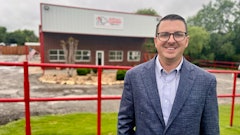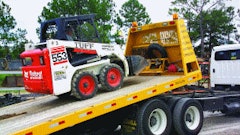By Jared Everett
When businesses begin to become financially strained one of the first budgets cut is maintenance, especially preventative maintenance. While there are short-term reasons to reduce maintenance budgets, these firms will be faced with more costly future repairs as a result of improper annual maintenance. So how does a company dependant on pavement maintenance and new construction survive during a time when both of these industries have slowed down?
1. Focus on internal efficiencies. You might not be able to directly impact how many customers are knocking on your door but you can make an impact on your internal cost controls and improve profitability.
Consider how many employees are using company funded cell phones. Are these phones a convenience or a business necessity? Do your employees leave vehicles or equipment running during conversations or breaks? Are you paying employees overtime when changing how you schedule jobs or hiring one additional part-time employee might avoid higher cost overtime? Can you consolidate office and support staff?
The goal of internal cost controls is to eliminate or minimize any expense that does not contribute to or facilitate business development and sales. In many instances this requires taking a hard look at some expenses that may appear to be essential when in reality they are just convenient.
2. Have all employees participate in business development. Speak in general and measured terms to all your employees that times are difficult and your company will survive, but it will require everyone to work hard, work together, be efficient, and provide excellent customer service. Now is not the time to lose even a single customer. Give examples to employees on how to participate in generating sales. Here is an idea to start with: During a paving job, an adjacent business (or homeowner) approaches your crew and says he has been thinking his parking lot (or driveway) needs some work. In the past your crew might have given a business card or office phone number to that person, requiring him to act.
But there's a better way: Your crew should immediately refer that person to the on-site foreman who should schedule an appointment for the customer to meet with an estimator or salesperson. If possible the on-site supervisor should immediately walk the area with the customer, take some digital photos and measurements, and get the customer's contact information to send an estimate.
This might require that you provide additional training and empowerment to your field staff, but every time a customer has to initiate an action, a percentage of them fail to act. Minimize the requirements you place on the customer and bring the information to the customer; don't require him to seek it out.
3. Cast a bigger net. If you throw out a 6-foot net and consistently catch two fish per throw, it might make sense that with a 12-foot net you would catch four fish per throw. How do you cast a larger net? If your business primarily focuses on residential work now might be the time to chase commercial or government business, or visa versa. If you focus your efforts in one geographic area maybe now is the time to find a second area from which to seek business. If you have primarily focused on business from a relatively small pool of regular customers maybe now it the time to assertively seek new customers. If your firm offers four basic types of service or products is there a fifth product or service you can start to provide that is complimentary to your standard offerings. A good resource is to speak with your key customers and see what additional work or service they wished you would provide. Seek additional products or services with reasonable barriers to entrance. The other day I was speaking with an owner of a drywall business and he successfully started a cabinet sales and installation business. When I asked him how he decided on cabinets he said his customers really liked his service and quality of work and wished he would provide more services, specifically cabinets and cabinet installation. Your key customers need to be thought of as your partners, and you should seek their advice and opinions.
4. Utilize networking and learning opportunities. Don't underestimate the importance of established formal and informal communication networks. Challenges your company faces are probably the same that other firms are currently facing or have faced and conquered in the past. Reaching out to these professional networks provides an opportunity to brainstorm real solutions.
Locally it might be difficult to speak with competitors about common challenges and solutions, but as long as both parties benefit from the communication competition concerns can be mitigated. If you are concerned about speaking too openly with local competitors attending regional or national industry conferences such as the National Pavement Expo provides the opportunity to speak with professionals in your industry that are not local competitors. Use these opportunities to seek solutions to your challenges, and don't forget to speak with vendors about new products and technology that might benefit your business. Two heads are better than one, and through networking you can tap into the experience of hundreds of people.
5. Improve your coordinated sales and marketing efforts. What is the difference between advertising and marketing? Again, like throwing a net for fishing, advertising is throwing a net into the water for fish; marketing is throwing the net where you know there are fish and where you have caught fish in the past. Improve your ability to attract customers through targeted marketing, focus on additional business from key customers, and coordinate all your company materials and employee training so there is a common and professional message that attracts business.
6. Sow seeds now for future harvesting. As previously stated, many individuals and firms reduce their construction or maintenance budgets during difficult economic times. While this is currently unfortunate, it will result in a backlog of maintenance projects that will be larger, more numerous, and more costly in the future. Develop relationships with potential customers and foster those relationships even if you are not getting their business right now. Then in the future you will be positioned with the key relationships to take advantage of numerous previously postponed projects.
While times may be difficult during this period of economic uncertainty, now is the time to do more than just survive. Focus on internal efficiencies, business and employee development and building key relationships that will provide monumental rewards when the economy improves.
Jared Everett, president of Everett Professional Services, has a unique perspective on the pavement maintenance industry as he has been both a buyer and seller of services. He is a regular presenter at National Pavement Expo West and can be reached at 2274 Elderberry Place, Boise, ID 83706.



























